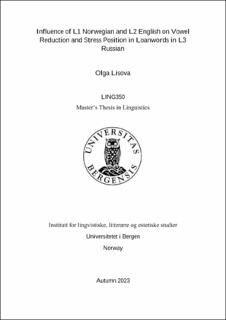| dc.contributor.author | Lisova, Olga | |
| dc.date.accessioned | 2024-01-12T00:37:52Z | |
| dc.date.available | 2024-01-12T00:37:52Z | |
| dc.date.issued | 2023-11-20 | |
| dc.date.submitted | 2023-11-20T12:01:23Z | |
| dc.identifier | LING350 0 O ORD 2023 HØST | |
| dc.identifier.uri | https://hdl.handle.net/11250/3111220 | |
| dc.description.abstract | Denne studien satte søkelys på de fonologiske trekkene ved uttalen av engelske lånord i russisk av norsktalende (L1) når de lærer russisk som tredjespråk (L3). Hovedmålet var å bestemme innflytelsen av L1 norsk og L2 engelsk på prosessene vokalreduksjon og stressplassering i lånord i L3 russisk. Til dette formålet ble det utarbeidet en liste av ord, inkludert målord (låneord) og kontrollord som tilsvarer målordene. Det ble gjort lydopptak av ni norsktalende mens de leste frasene som inkluderte mål- og kontrollordene, og lydfilene ble kommentert og analysert. Resultatene av analysen viste at reduksjonen var påvirket av om ordet var mål- eller kontrollord siden vokaler, ifølge statistikken, ble redusert oftere i mållord enn i kontrollord. Studien bekreftet at å matche stress i L1 eller L2 med stress på russisk fremmer nøyaktig uttale, spesielt i høyfrekvente ord. Funnene utvider vår forståelse av dynamikken i språktilegnelse og fremhever viktigheten av forholdet mellom første- (morsmål) og andrespråk i tilegnelsen av et tredjespråk. | |
| dc.description.abstract | This study focused on the phonological features of the pronunciation of loanwords from English by Norwegian speakers (L1) when learning Russian as a third language (L3). The main goal was to determine the influence of L1 Norwegian and L2 English on the processes of vowel reduction and stress placement in loanwords in L3 Russian. For this purpose, a list of words was compiled, including target (loanwords) and control words corresponding to these target words. Nine Norwegian speakers were audio recorded when they were reading the carrier phrases that included target and control words, and the audio files were annotated and analyzed. The results of the analysis showed that the reduction was influenced by whether the word was target or control since, according to the statistics, vowels were reduced more often in target words. The study confirmed that matching stress in L1 or L2 with stress in Russian promotes accurate pronunciation, especially in high-frequency words. The findings expand our understanding of the dynamics of language acquisition and highlight the importance of the relationship between the first (native) and second languages in the acquisition of a third. | |
| dc.language.iso | eng | |
| dc.publisher | The University of Bergen | |
| dc.rights | Copyright the Author. All rights reserved | |
| dc.title | Influence of L1 Norwegian and L2 English on Vowel Reduction and Stress Position in Loanwords in L3 Russian | |
| dc.type | Master thesis | |
| dc.date.updated | 2023-11-20T12:01:23Z | |
| dc.rights.holder | Copyright the Author. All rights reserved | |
| dc.description.degree | Lingvistikk mastergradsoppgave | |
| dc.description.localcode | LING350 | |
| dc.description.localcode | MAHF-LING | |
| dc.subject.nus | 711727 | |
| fs.subjectcode | LING350 | |
| fs.unitcode | 11-21-0 | |
